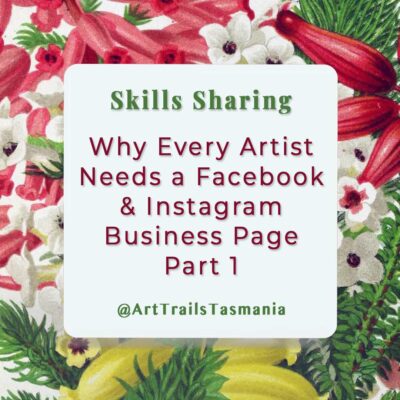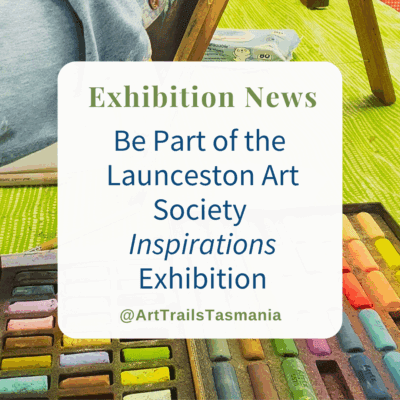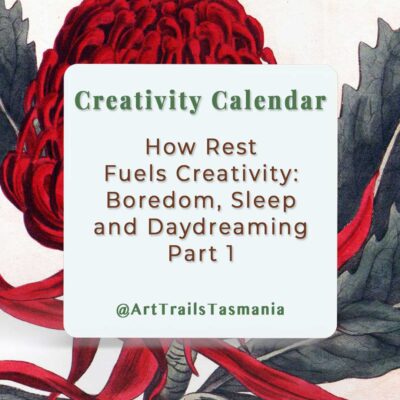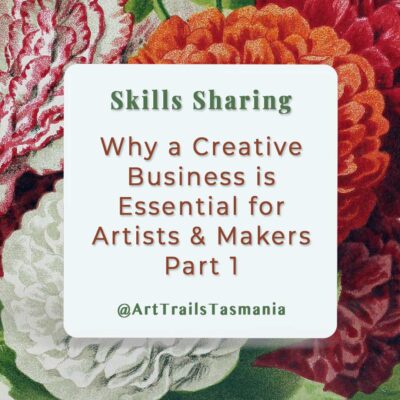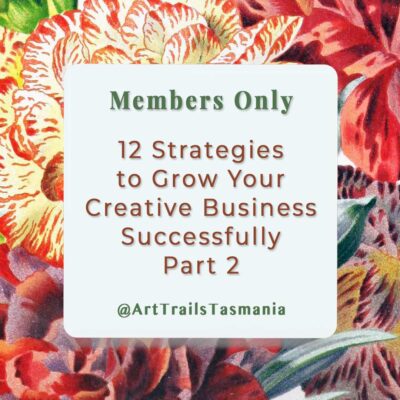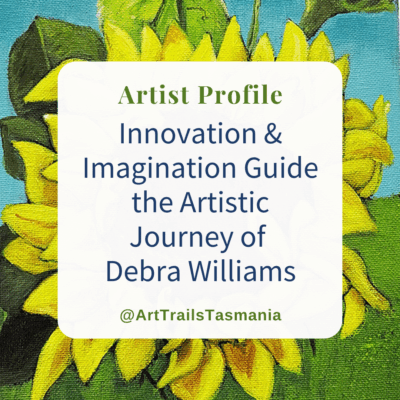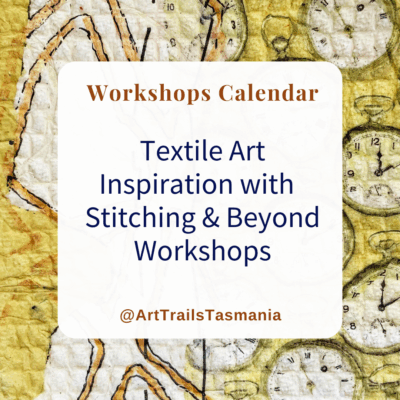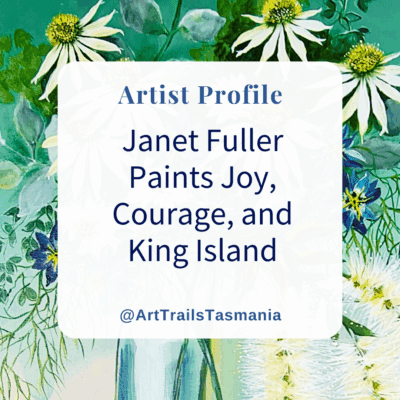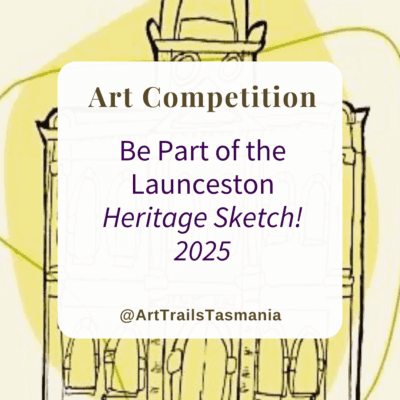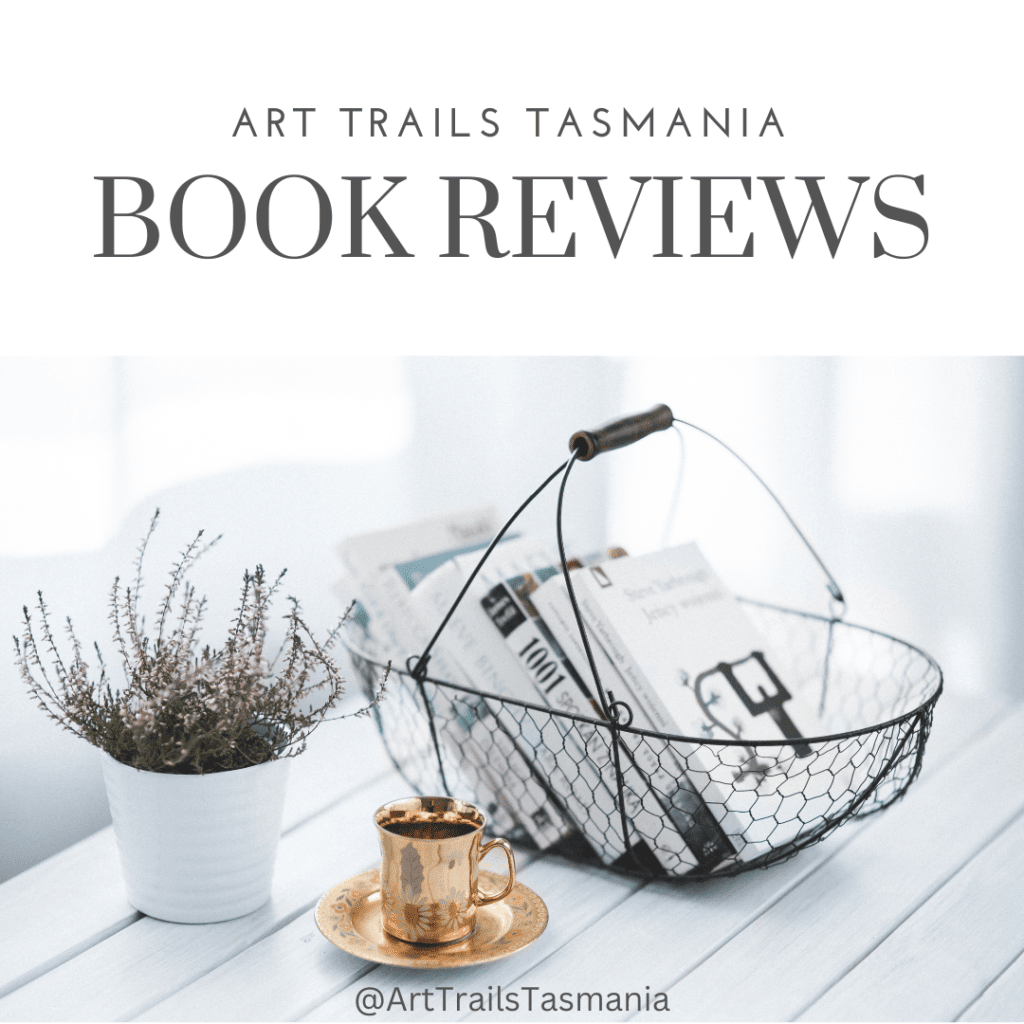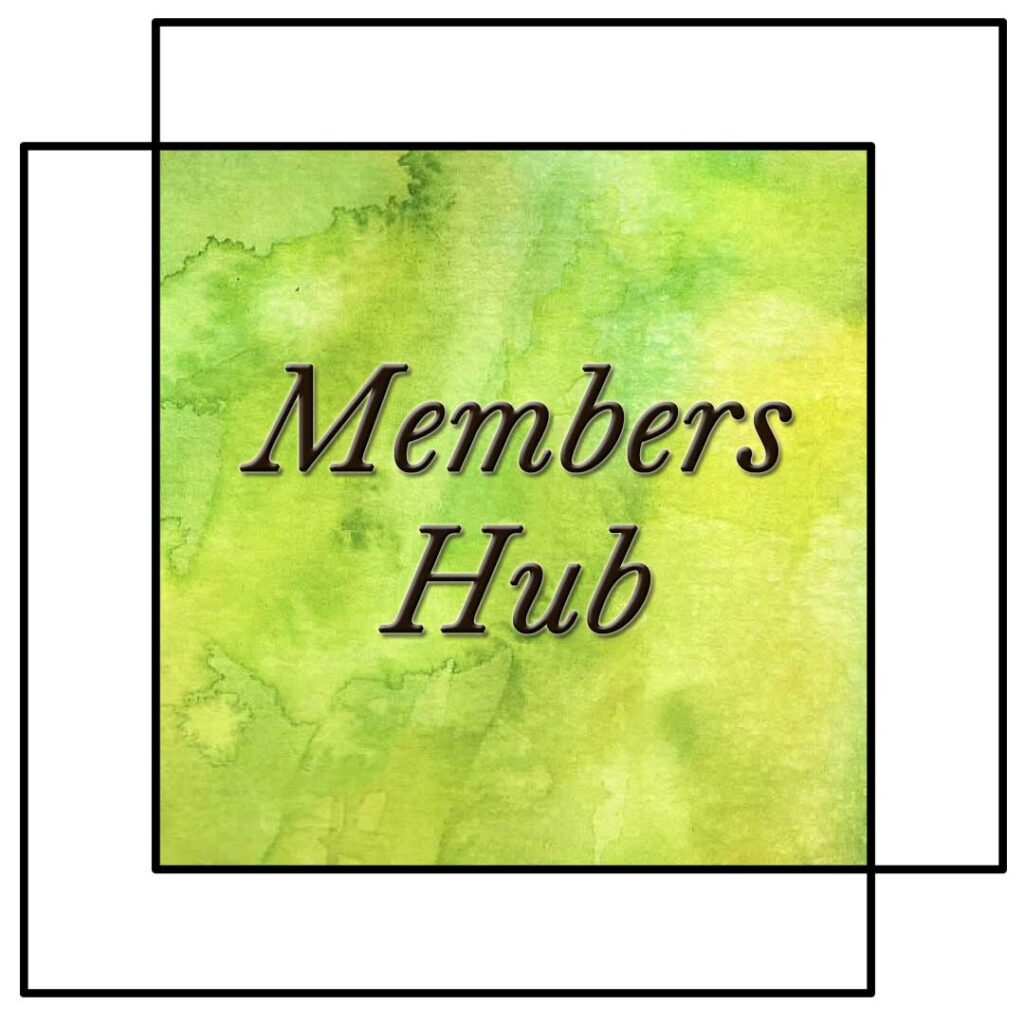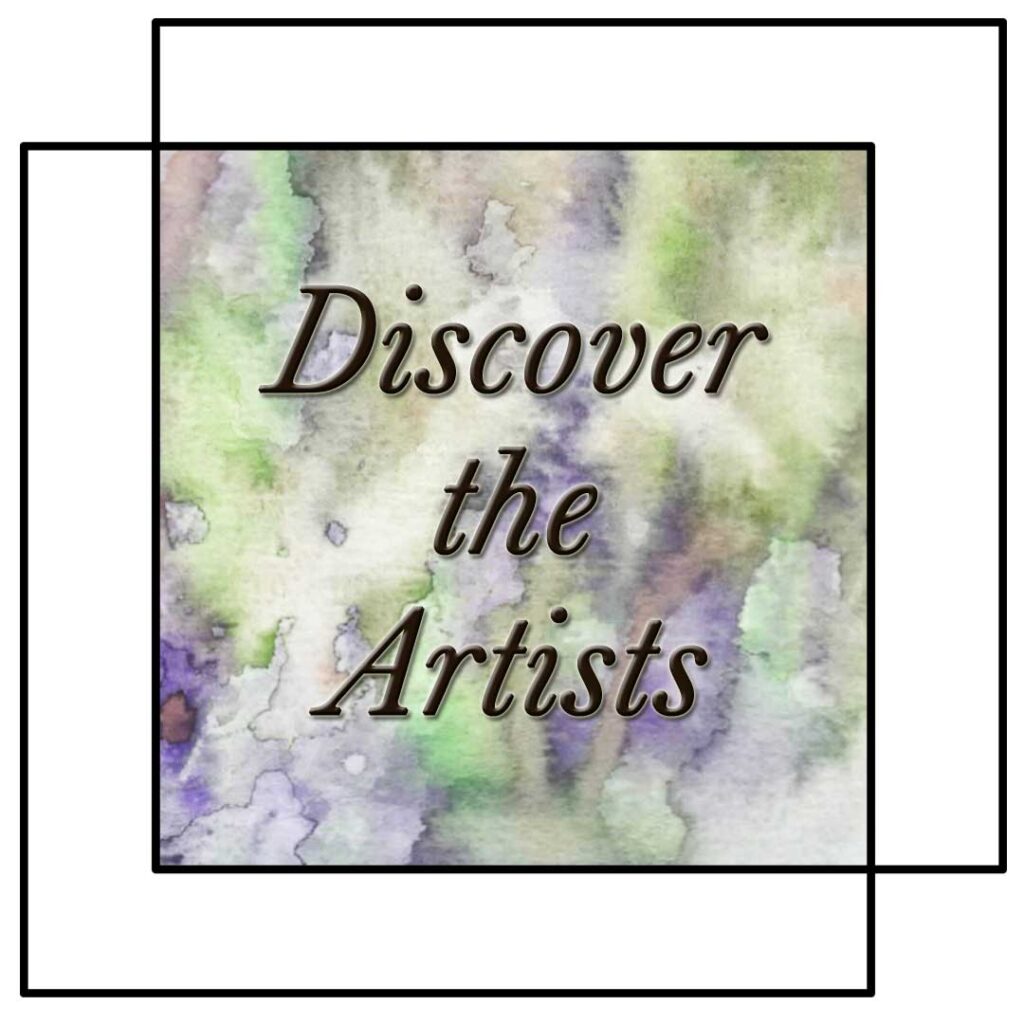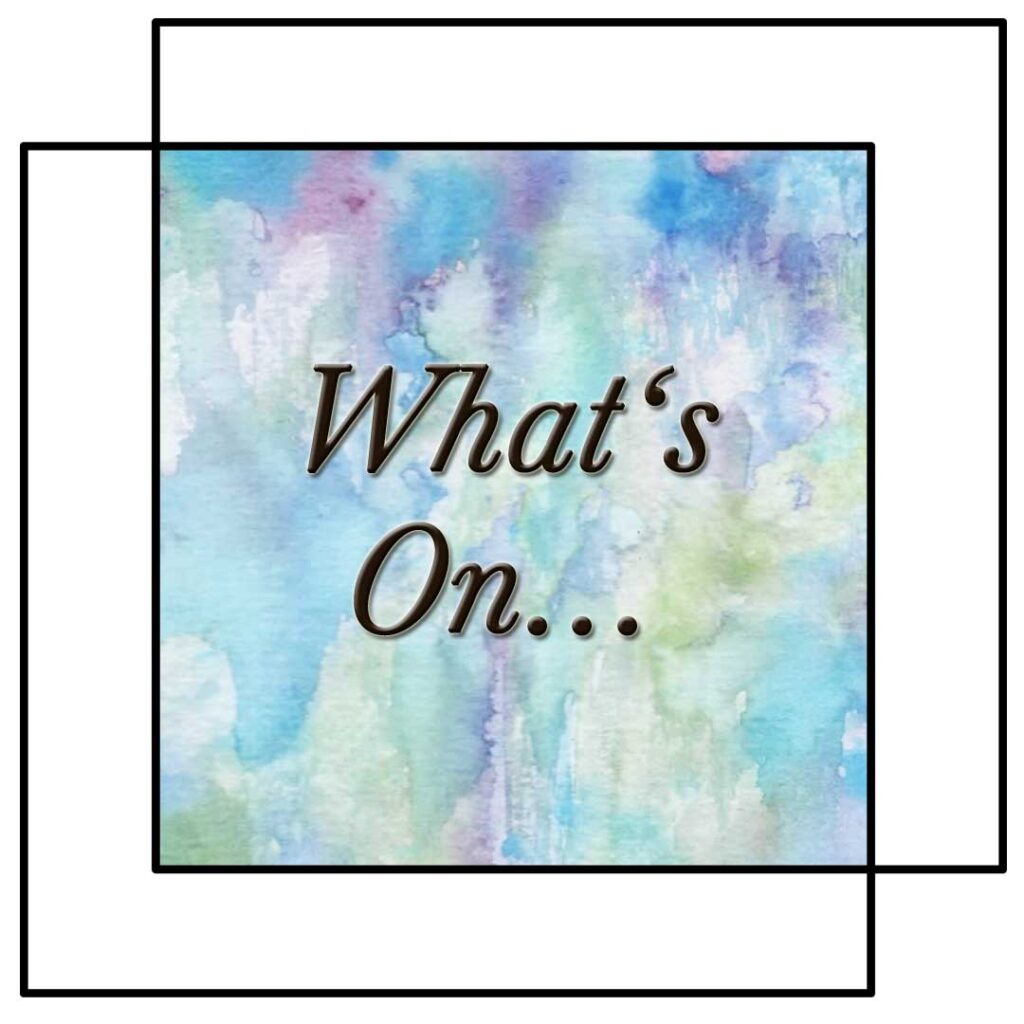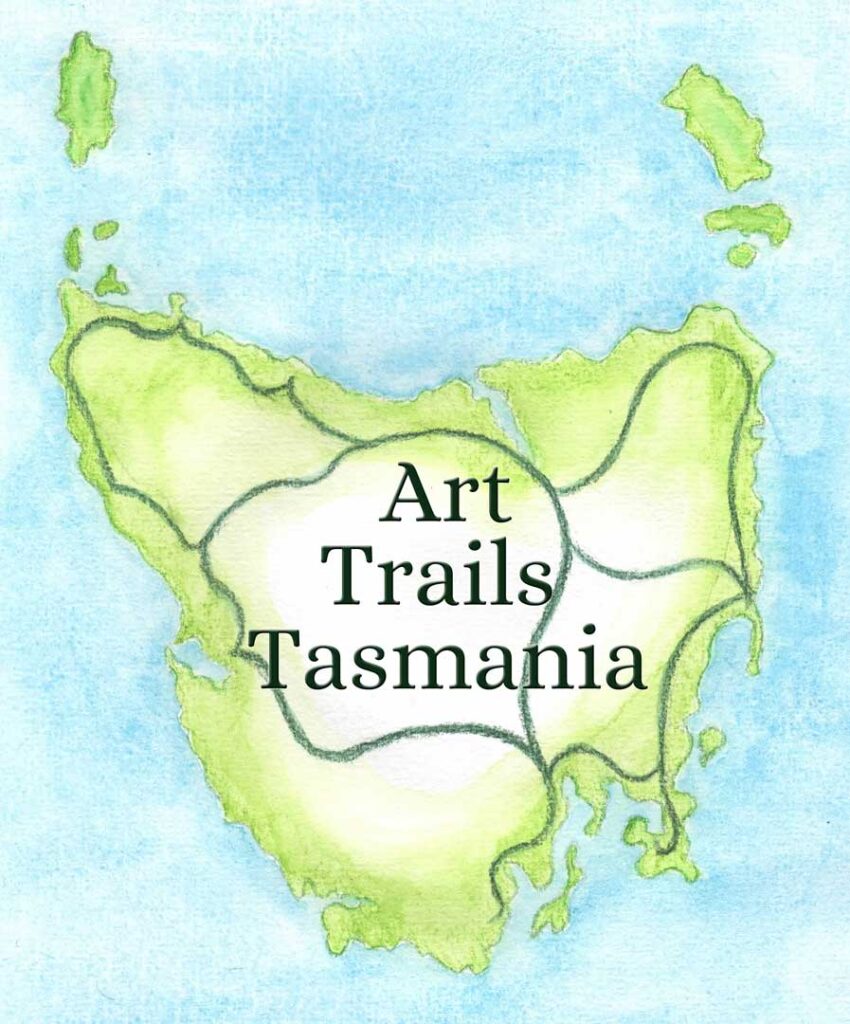Workshops: A Source of Inspiration and a Healthy Income
Workshops are an incredible way for artists to expand their creative horizons and connect with others in meaningful ways and earn a important income from their creative talents.
This is Part 1 of a series on running and leading workshops. It explores how workshops enhance an artist’s practice and financial prosperity. Workshops can also inspire participants and foster creativity.
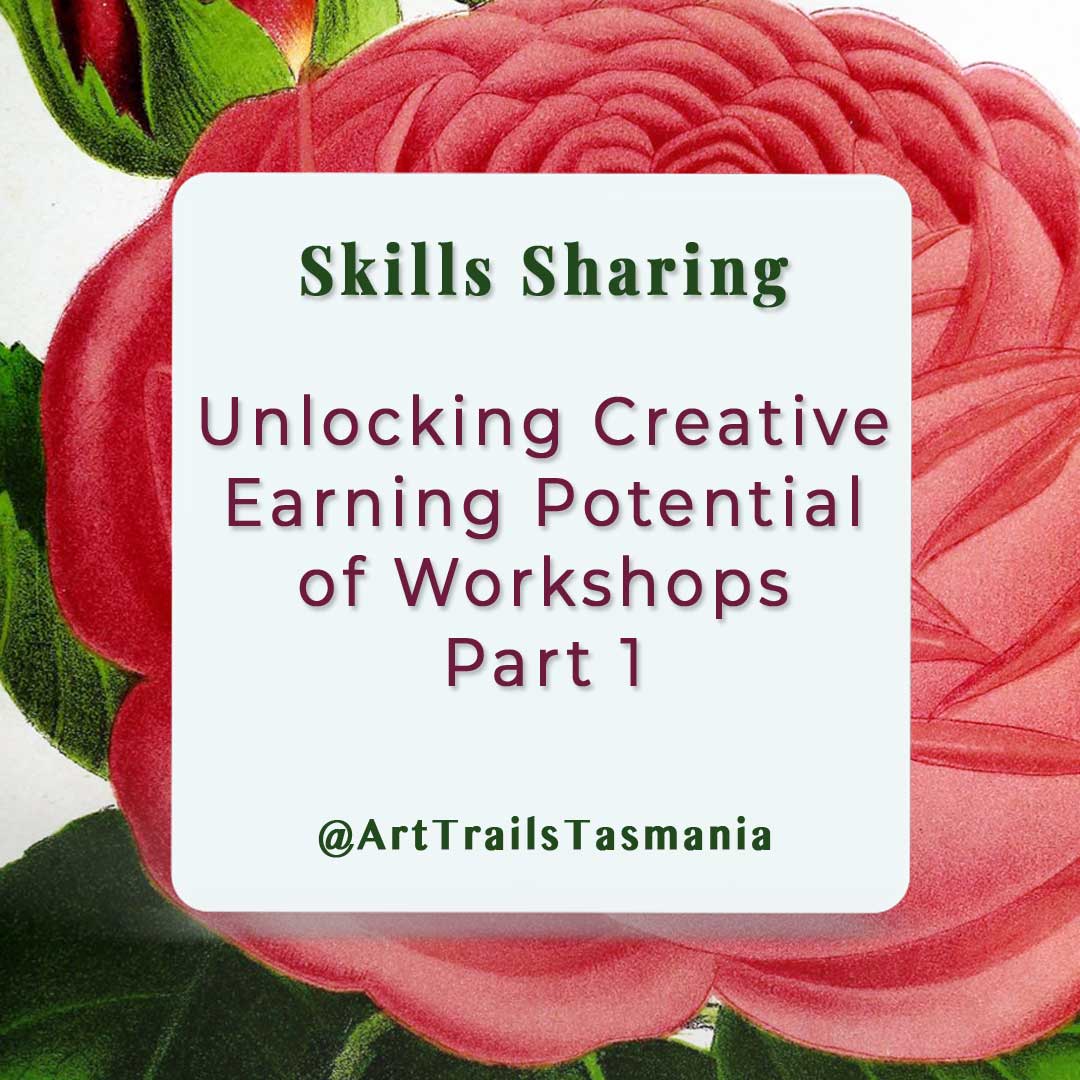
This series examines practical methods for running successful workshops. It also covers the realities of making workshops a sustainable income source. Be sure to dive into our 9 Bright Ideas for Artist Led Workshops – Part 2 to kick start your workshops!
Evolving with Workshops
Leading workshops challenges artists to articulate their creative processes, often uncovering fresh insights into their work. It’s a unique opportunity to reflect, adapt, and evolve.
Workshops also foster experimentation, with participants bringing diverse perspectives that spark new ideas and directions.
In this series, we’ll delve into the key aspects of earning a living with workshops, starting with collaboration and marketing to scheduling and frameworks.
Whether you’re an artist seeking growth or looking to build a vibrant creative community, workshops are a transformative tool.
Read on for insights into making your workshops impactful, enjoyable, and professionally and financially rewarding.
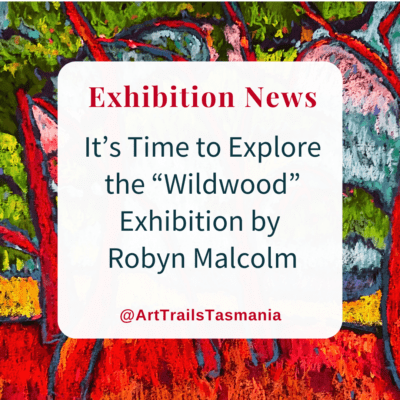
Wildwood Art Exhibition by Robyn Malcolm
Explore WILDWOOD, an exhibition of richly coloured tree paintings by Robyn Malcolm, revealing her mastery of pastel and oil and her instinctive use of colour.
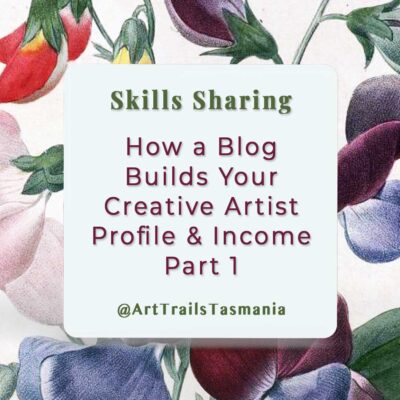
How a Blog Builds Your Creative Artist Profile and Income – Part 1
In part 1 in our series on how to make a blog grow your artist profile and income, we dive into what it is and how to get it working for you.
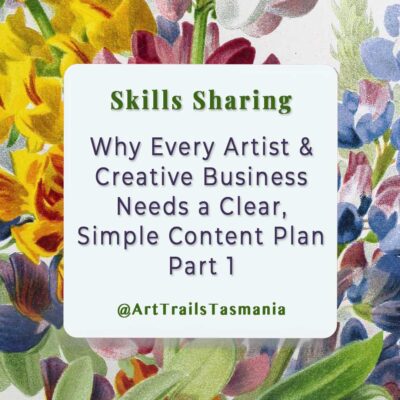
Why Every Artist and Creative Business Needs a Clear, Simple Content Plan – Part 1
In Part 1 in our series on Content Planning we explore why having a clear and simple content plan is so important for your growing creative business.
The Creative Value in Running Workshops
Leading creative workshops can significantly enhance your personal practice, offering a fertile ground for growth and innovation.
Firstly, the act of teaching requires you to articulate your processes and philosophies, often revealing new insights about your own work.
This reflective practice can lead to a deeper understanding of your creative instincts and techniques, which you can then refine and expand.
Workshops also encourage experimentation. Engaging with diverse participants, each with unique perspectives and ideas, challenges you to step outside your comfort zone and explore new approaches.
This exchange of ideas can spark fresh inspiration, helping you to break through creative blocks and develop novel concepts.
Nurturing Adaptability and Connection
Moreover, the collaborative atmosphere of a workshop nurtures adaptability. You must tailor your methods to suit different skill levels and learning styles, fostering a dynamic and responsive mindset.
This adaptability often translates into greater versatility within their personal practice.
Running workshops can also provide a sense of purpose and connection. Witnessing the impact of your guidance on others’ creativity can be profoundly rewarding, reaffirming the value of your artistic vision.
These interactions can foster a supportive community, creating a network of inspiration and mutual encouragement.
Skill Building Beyond the Studio
Finally, workshops offer opportunities for skill-building beyond the studio.
From honing communication abilities to managing logistics, these experiences build confidence and resourcefulness, empowering you to tackle challenges within your own work with greater resilience and creativity.
By engaging in these enriching experiences, artists can evolve both as creators and as catalysts for creativity in others.
The Value and Power of Collaborating
Collaborating with another artist, group, or organisation to run and promote your workshops can be highly beneficial, offering mutual enrichment and professional growth.
Firstly, partnerships introduce diverse perspectives and complementary skills. Working with others allows you to merge your strengths, explore fresh ideas, and tackle challenges collectively, often leading to innovative and dynamic workshop experiences.
Grow Your Reach
Collaboration can expand your reach. Partnering with organisations or groups often provides access to broader audiences and specialised resources, such as venues, marketing channels, or funding.
Be sure that in any promotion of your workshops with others that there are links back (called back-links) to your website, registration pages, and social media profiles.
This exposure can boost your artist’s profile and open doors to new opportunities within and beyond your practice.
Learning as a Creative Business Owner
Learning from others is another key advantage. Collaborating with fellow creative business owners (aka artists and makers earning a living from their creativity) enables an exchange of techniques, methods, marketing strategies and insights.
Observing how others approach teaching and problem-solving can inspire growth and adaptability, enhancing your own workshop delivery and creative practice.
Collaborating with Groups, Projects and Organisations
Working with organisations or groups also fosters community engagement.
These entities often have established relationships within local or specific networks, helping artists build connections and strengthen their influence within the community. They may also have valuable email newsletter and social media audiences who are very interested in what you are doing.
This shared engagement can lead to long-term partnerships and support systems.
Additionally, the collaborative process can lighten the workload, allowing you to focus on your strengths while others handle complementary tasks. This division of labour reduces stress and encourages a more enjoyable, balanced experience.
Overall, collaboration enriches the workshop process, nurtures professional development, and fosters meaningful connections, making it a powerful tool for growth in an artist’s career.
Marketing and Promoting Workshops is Vital
Marketing and promoting workshops is crucial for their success, as it ensures the intended audience is reached and engaged.
Without effective promotion, even the most well-planned workshops can struggle to attract participants, diminishing their impact and viability.
Let the Right People Know That You Exist
Firstly, marketing increases visibility so people know that your workshop exists. Promoting workshops through social media, websites, email campaigns, projects like Art Trails Tasmania and local networks raises awareness among potential attendees.
Targeted promotion allows you to connect with the right audience, ensuring that the workshop resonates with those who will benefit most from it. This makes it much easier to sell tickets.
Establishing Credibility Makes Selling Tickets Easier
Effective marketing also establishes credibility. Professionally designed promotional materials and clear messaging about the workshop’s value, objectives, and outcomes create a positive impression.
This builds trust and motivates people to invest their time and money in attending.
Promotional efforts can differentiate a workshop in a competitive market. Highlighting unique features, such as the artist’s expertise, innovative techniques, or a specific theme, helps attract interest and set the workshop apart.
The Lasting Impact of Consistency & Financial Sustainability
Moreover, consistent marketing helps to build a brand over time. Regularly promoting workshops enhances an artist’s reputation as a facilitator, leading to increased recognition and opportunities.
Word-of-mouth from previous attendees, driven by successful promotion, can also amplify outreach.
Lastly, effective marketing ensures the workshop’s financial sustainability. Filling seats means covering costs and potentially generating profit, enabling you to continue offering workshops and developing your practice.
In short, marketing is not just an add-on but a fundamental aspect of running successful workshops, ensuring they reach their full potential and impact.
Regular Opportunities to Earn Your Creative Income
Running workshops can provide artists with a reliable income stream alongside their creative projects.
Workshops offer regular opportunities to earn, reducing dependence on sporadic sales.
By setting a schedule, you can plan for consistent cash flow and improved financial stability.
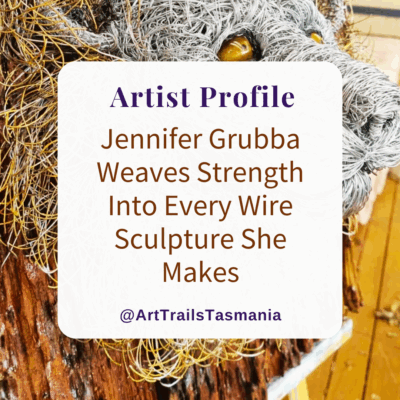
Jennifer Grubba Weaves Strength Into Every Wire Sculpture She Makes
Through healing and creativity, Jennifer Grubba transforms wire sculpture into soulful art, using each twist to calm the mind and express her recovery journey.
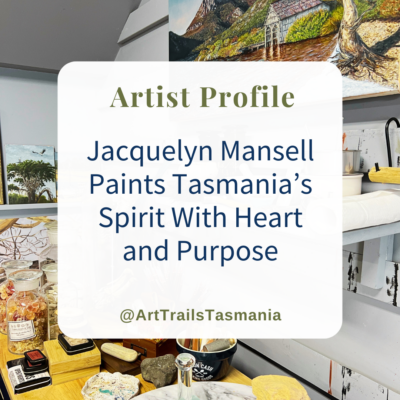
Jacquelyn Mansell Paints Tasmania’s Spirit With Heart and Purpose
Jacquelyn Mansell captures the wild beauty of Tasmania through soulful landscape art that connects artist viewer and place in a deeply meaningful way.
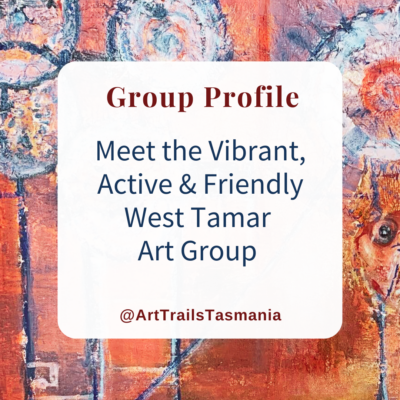
Meet the Vibrant, Active and Friendly West Tamar Art Group
Come meet the West Tamar Art Group, a vibrant community where artists & makers connect, create, & showcase their work in Tasmania’s stunning West Tamar region.
No Results Found
The page you requested could not be found. Try refining your search, or use the navigation above to locate the post.
Build a Steady Client Base for Financial Success
Teaching workshops builds a steady client base, encouraging repeat participation and word-of-mouth referrals.
Artists can also scale their offerings by hosting multiple sessions or online workshops.
Workshops allows you to diversify your income while enhancing your visibility within the community.
This creates opportunities for collaborations, sponsorships, and partnerships.
Providing group or one-to-one sessions can cater to different budgets, making workshops more accessible.
Selling materials or artwork during sessions adds another revenue stream.
Sustainable Growth with a Schedule of Workshops
Running workshops not only nurtures others’ creativity but also supports sustainable growth for you.
A planned workshop calendar can transform an irregular creative income into a healthier, dependable financial foundation for long-term success.
Developing a schedule of workshops is a crucial step in ensuring their success and sustainability.
A well-planned schedule provides clarity, structure, and professionalism, benefiting both the artist and participants.
Attract More Participants with a Calendar of Workshops
Firstly, a clear schedule helps attract participants. By outlining dates, times, and workshop themes in advance, potential attendees can plan accordingly, significantly increasing the likelihood of enrolment.
This is particularly important for those with busy lifestyles, as it enables them to fit workshops into their calendars. Our Members’ Calendar of Workshop event news stories are always popular with our Community Newsletter readers.
Build Valuable Momentum with a Schedule of Workshops
A schedule also supports consistency and builds momentum.
Regularly scheduled workshops create a reliable rhythm, helping to establish a loyal audience and a recognisable presence in the community.
This consistency fosters trust and positions you as a dependable facilitator.
For the artist, a planned schedule aids in resource management.
It allows time to prepare materials, promote workshops, and address logistical details, ensuring a smooth and professional delivery.
It also prevents last-minute stress and helps maintain a high standard of quality.
Be Smart with Your Planning
Additionally, scheduling workshops in advance provides opportunities for strategic growth.
You can plan workshops around seasonal themes, holidays, or events, aligning with potential market demand.
It also allows for collaboration with other artists or organisations, creating a richer and more diverse offering.
Plus it lets you plan around the key events in your own life and add income generating events during previously quiet periods.
Finally, a structured schedule supports personal balance and avoids burnout.
By organising your time effectively, you can manage your workload and ensure sufficient energy and creativity for each workshop.
In conclusion, a well-developed schedule is vital for successful, sustainable workshops, benefiting both artists and their audiences.
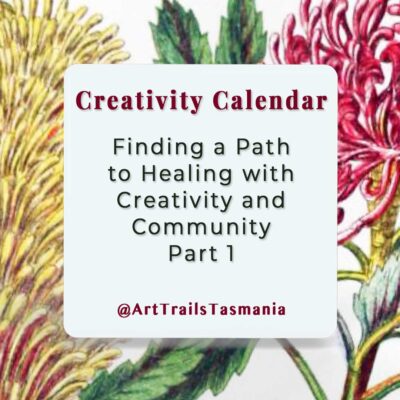
Finding a Path to Healing with Creativity and Community Part 1
In this deeply personal piece, Art Trails Tasmania founder, Belinda Stinson, shares how creativity & community is nurturing her through her journey with grief.
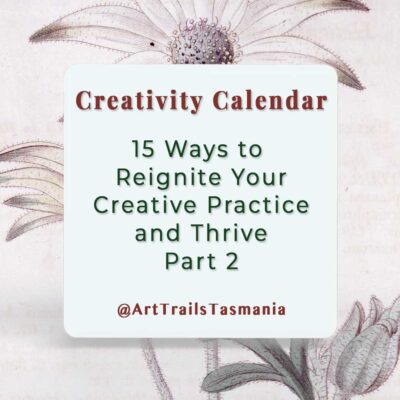
15 Ways to Reignite Your Creative Practice and Thrive Part 2
In Part 2 of our series on flourishing with your creative practice we explore 15 ways to find your path back to creativity, letting you live the Good Life your way.
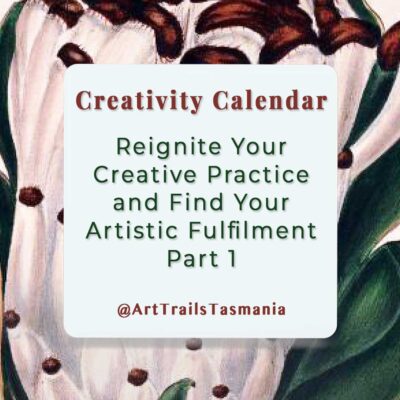
Reignite Your Creative Practice and Find Artistic Fulfilment Part 1
Finding your path back to creativity and reigniting your creative practice can bring a deep sense of artistic fulfilment is the focus of Part 1 in our series.
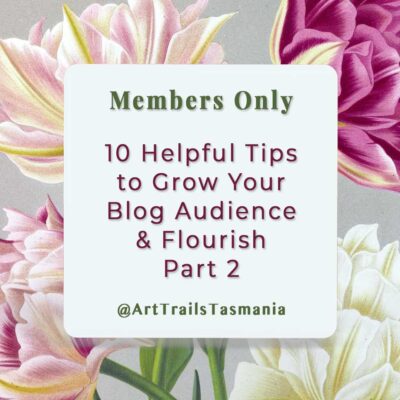
10 Helpful Tips to Grow Your Blog Audience and Flourish Part 2
In Part 2 of our series we dive into 10 very practical tips and insights on how to grow your blog audience to flourish creatively and financially.
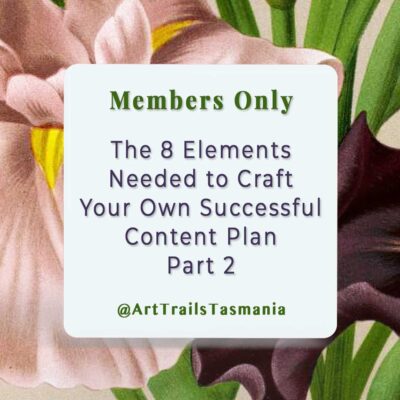
8 Elements Needed For Your Successful Content Plan – Part 2
In Part 2 in our series on Content Planning we go through the vital 8 elements needed to craft your own successful Content Plan.
The Brilliance of Having a Well Planned Workshop
Having a well-structured framework for your workshops is highly beneficial, ensuring clarity, engagement, and effectiveness.
A clear framework provides a roadmap for both the facilitator and participants, enabling the workshop to flow smoothly and meet its objectives.
Structure Defines Purpose
Firstly, a structured framework helps define the workshop’s purpose and outcomes.
By setting clear goals and breaking them into manageable segments, participants can easily follow the session and stay engaged. This ensures they leave with a sense of accomplishment and tangible takeaways.
A well-thought-out structure also enhances time management.
Managing Time in Your Workshop
Allocating specific durations for activities, discussions, and breaks ensures that the workshop stays on track and covers all planned content without feeling rushed or drawn out.
This balance creates a more enjoyable and productive experience for participants.
Moreover, a framework supports adaptability. While structure provides order, it also allows room for flexibility. Facilitators can adjust activities or pacing based on the group’s needs, without losing sight of the overall goals.
From a professional standpoint, a clear framework reflects your expertise and preparation.
It builds credibility, ensuring participants feel confident in the facilitator’s ability to lead a meaningful session.
Finally, a structured workshop is more likely to deliver consistent quality.
This encourages repeat attendance and positive word-of-mouth, helping to grow your reputation.
In essence, a well-structured framework is a foundation for success, enabling workshops to be organised, impactful, and memorable for all involved.
In 9 Bright Ideas for Artist Led Workshops – Part 2, we look at nine workshop ideas for you to explore so you can get you started with running workshops and bringing in a consistent and sustainable income.
Read the Latest Blog Stories and Flourish…
Why Every Artist Needs a Facebook and Instagram Business Page – Part 1
Why It Matters to Have Facebook and Instagram Business Profile Pages There comes a point in every artist’s creative journey where simply sharing your work online isn’t enough. You start to notice that some artists seem to have real momentum – their posts are being...
The Launceston Art Society Inspirations Exhibition
You're Invited to attend the Launceston Art Society's "Inspirations" Exhibition The Launceston Art Society proudly presents “Inspirations”, a community art exhibition showcasing the diverse talents of local members, with visitors invited to vote for their favourite...
How Rest Fuels Creativity: Boredom, Sleep & Daydreaming Part 1
Why Boredom, Sleep, and Daydreaming Fuel Creativity Creativity is not confined to bursts of high energy or moments of intense focus; creativity also thrives in quieter spaces, where creativity grows naturally as the resting mind nurtures creativity through calm,...
Why a Creative Business is Essential for Artists & Makers Part 1
Selling Your Work and Your Creative Business A creative business allows artists, makers, and crafters to turn passion into possibility, sharing work with the world while creating meaningful income. Building a creative business is not about waiting for buyers to...
12 Strategies to Grow Your Creative Business Successfully – Part 2
Making your Creative Business a Success A creative business can transform your passion into a sustainable livelihood, but knowing where to start and how to grow takes guidance and patience. Following on from Part 1, Why a Creative Business is Essential for Artists...
Innovation and Imagination Guide the Artistic Journey of Debra Williams
Being Brave with Your Artistic Journey I strive to create an outcome that I have envisaged, but sometimes the art takes me into a different sphere, and the outcome is better. I love experimenting with different media. This month, I have a large portrait entered in a...
Textile Art Workshops with Stitching and Beyond
Textile Art Workshops to Inspire Workshops are central to Stitching and Beyond’s creative programme, giving textile artists and makers the chance to explore new techniques and ideas. This latest calendar of workshops from October to January, highlights the richness of...
Janet Fuller Paints Joy, Courage & King Island
Inspiration is Everywhere on King Island I love it when things just work. That one amazing brushstroke that elevates the ordinary to something that makes you go "wow, that's it". When colours come together in a way that's so bold they explode off the canvas, or so...
The Launceston Heritage Sketch 2025
An Art Competition for All Kinder to Year 12 Launceston is a city steeped in history, nestled amidst breathtaking natural landscapes, and filled with vibrant neighbourhoods and cherished landmarks. This competition invites budding young creatives of all skill levels...
Read What Our Members Say About Belonging
Join the growing, supportive artists community today and have your Artist story told here.
Belinda is doing a great job creating a professional looking artist hub online. Check out the profile I posted recently to see how well she does them. To all my artist friends let’s help make this THE go to place to discover local artists.
You won’t regret joining Art Trails Tasmania . It’s a welcoming community for creatives at any career stage.Becoming an Art Trails Tasmania member wasn’t a hard decision for me to make as it’s such a wealth of knowledge and support.Being member provides a quality way to showcase your creative endeavours and it’s quickly growing in reach.
We operate a home based picture framing business and recently joined Art Trails Tasmania as a means to giving us exposure to the wider artist community. We have almost immediately seen increase in activity thru our online sites, which I am certain will lead to more opportunities to grow our business.


